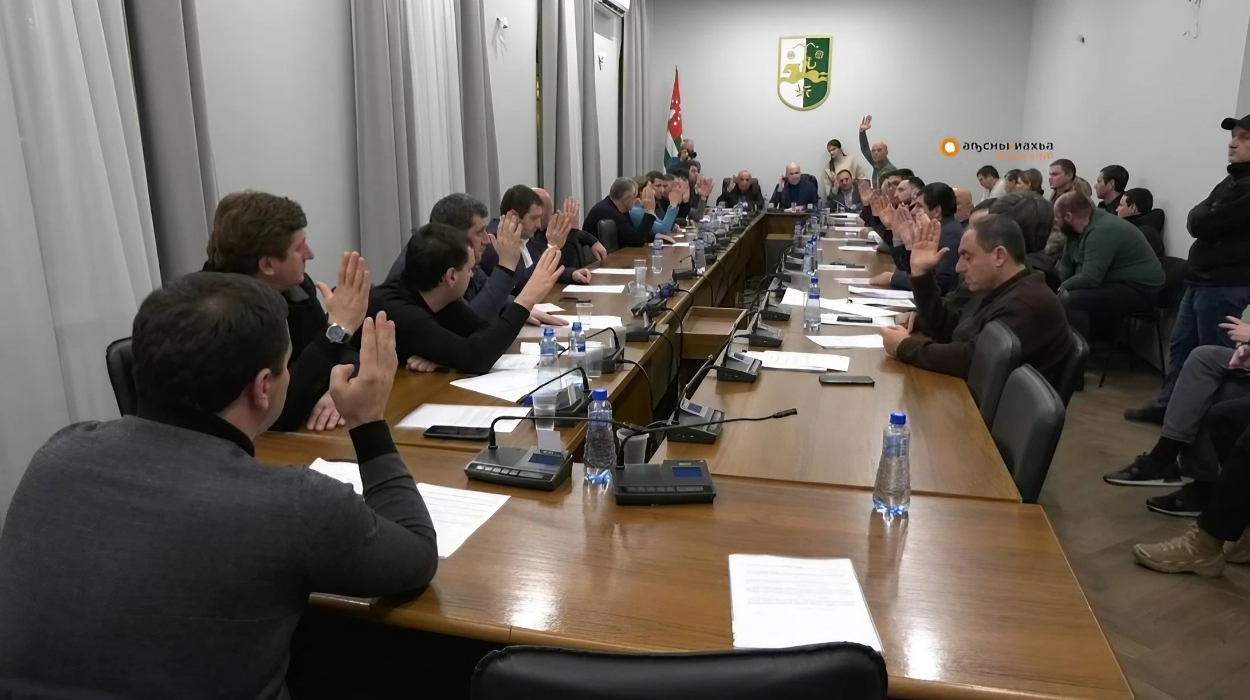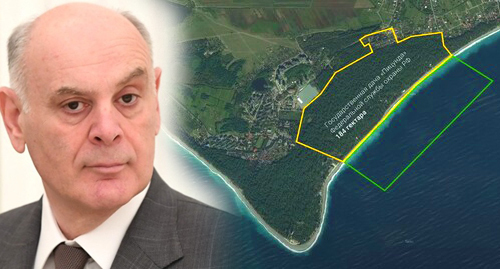Abkhazian Parliament Ratifies Transfer of Pitsunda State Dacha to Russia

Early morning, the Abkhazian parliament approved transferring the Pitsunda state dacha to Russia.
SUKHUM / AQW'A ― Early in the morning, the Abkhazian parliament approved the transfer of the Pitsunda state dacha to Russia. During an extraordinary early morning session, the Parliament of the Republic of Abkhazia ratified the Russian-Abkhazian agreement, confirming the transfer of the Pitsunda state dacha to Russia.
This development was conveyed to the opponents of the agreement, who had been outside the parliament building since the previous evening, by Lasha Ashuba, the Speaker of the legislative body. Access to the Parliament was granted exclusively to journalists from Apsua TV, with other media representatives denied the chance to obtain comments from the deputies.
"Everyone, including the parliament deputies and those who visited the parliament, was concerned about this issue. Today we hosted a number of delegations and discussed various options for adopting this agreement to safeguard the republic. The first option, concerning coordinates, was accepted by the Russian side and communicated to us. The remaining issue pertained to 'third parties.' A meeting between government representatives and the opposition led to a consensus document, involving amendments to relevant laws, including the law on international treaties, the Civil Code, and a special constitutional law relating to the transfer of the state dacha. It stipulates that if the property is transferred to third parties, the agreement is terminated, and the property reverts to the Republic of Abkhazia," Ashuba explained.
He further noted that these decisions were subsequently deliberated in the parliament. "Deputies were initially reluctant to vote for the agreement with only the change of coordinates. However, a consensus was reached whereby deputies would vote for the agreement with the change of coordinates and a clause preventing the transfer of the property to third parties. In an extraordinary session attended by 28 deputies, we passed three laws and ratified the agreement with 26 votes (out of 35 deputies in total). All documents were adopted in the first, second, and third final readings," he added.
The parliament's decision was labeled "shameful" by opposition figures and public figures, who called for its annulment. Former ombudsman Asida Shakryl claimed the decision was illegitimate. "The worst we feared has happened. The deputies disregarded the Constitution of the Republic of Abkhazia and its laws. They have violated everything conceivable. The deputies must justify their decision to conduct an extraordinary session at night and its legality," Shakryl stated to journalists.
Inal Ardzinba, head of the Abkhaz Foreign Ministry, earlier stated that all necessary technical amendments to the agreement were made through an exchange of notes between the Russian Ministry of Foreign Affairs and Abkhazia, in line with international law and the Vienna Convention on International Treaties of May 23, 1969.
Russian Ambassador Mikhail Shurgalin clarified that the agreement does not involve transferring the land where the facility is located to Russia. "The territory is leased for 49 years, with only the buildings, to be maintained and repaired by the Russian FSO, transferred to ownership," he said.
He also mentioned that "for the majority of the population, this facility is associated with Russian President Vladimir Putin, who has held working meetings at the state dacha, as well as Foreign Minister Sergei Lavrov."

President Aslan Bzhania was keenly advocating for and is slated for discussion in the final parliamentary session of 2023.
The Pitsunda state dacha complex, constructed in 1958-1961 by order of Nikita Khrushchev, the General Secretary of the Central Committee of the CPSU, includes movable and immovable property, excluding land plots and a section of the sea, transferred to Russian ownership under the January 2022 agreement. The Abkhaz side transfers it to Russia on a gratuitous basis within six months of the document's enforcement. The Russian side receives the land plots where the object is located and an adjacent sea area on a 49-year lease at a rate of 1 ruble ($0.011) per year for each plot, with the right to carry out capital construction in agreement with the Abkhaz side. Property rights to any constructed buildings, structures, and facilities will belong to the Russian side.
The document states that the Russian side will use the object, land plots, and sea area for state events with protected individuals and for their recreational rest. It is agreed that the document lasts for 49 years, automatically extending for subsequent 15-year periods unless either party notifies the other in writing at least six months before the period expires. Termination of the agreement does not affect the ownership of movable and immovable property.
In September, Inal Ardzinba commented on the transfer of the Pitsunda state dacha to Russia, noting that the "informational support of the issue" had damaged the Abkhaz-Russian dialogue. He emphasized that Russia is central to Abkhazia's foreign policy, stating, "If we lose relations with Russia, we lose our main ally and a world power."